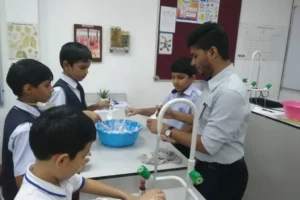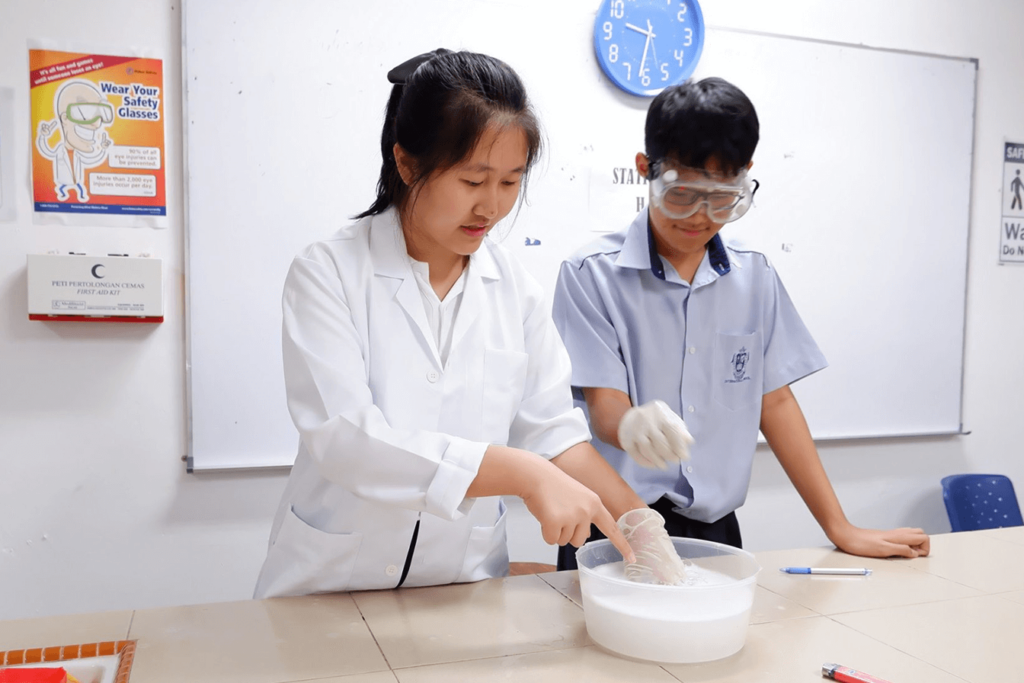
Which Academic Path Suits Your Child?
Table of Contents One of the most important decisions parents face is choosing the right academic path for their child. With so many educational




Technology has revolutionised conventional teaching methods by enabling access to
knowledge, supporting collaboration, and addressing varied learning needs. It provides learners with vital digital skills required for accomplishment in the modern world. Technology at Cambridge IGCSE schools allows personalised learning experiences, promoting engagement and effectiveness.
Teachers play a significant role in incorporating technology to empower learners, acting as guides and mediators throughout their educational journey. By effectively utilising technology, educators can personalise learning experiences, promote critical thinking, and develop creativity. They encourage students to turn into active learners by using technology, offering them the skills needed to succeed in the future.
This article examines how teachers can use technology to improve student learning. It dives into the changing role of educators in a digital age, offering guidelines for successful technology integration.
Let us start by comprehending the role of technology in modern education.
Recognising the influence of technology on learning is critical for navigating the constantly evolving terrain of education. As technology continues to impact educational environments, it transforms traditional methods, creating new opportunities and challenges. Here are a few ways it influences student engagement, academic results, and classroom dynamics
Learning technology has evolved dramatically, from simple tools like blackboards and projection screens to complex digital mediums and immersive simulations. This development gives educators new opportunities to engage students and personalise learning experiences. As technology advances, its integration into education can transform conventional classrooms into dynamic centres of interactive and shared learning.
Technological integration in education has several advantages, like extended access to educational resources, increased participation, and personalised learning experiences. It encourages partnership between students and teachers, enhances analytical thinking and problem-solving abilities, and prepares kids for success in a digitally driven future. Technology integration can improve instructional delivery and enable real-time feedback.
Adaptive learning uses technology to customise educational experiences based on student’s unique needs, interests, and learning speed. Personalised learning platforms use data-driven algorithms and tests to determine individual strengths and weaknesses. It enables educators to provide personalised material, learning paths, and resources, improving student involvement and academic success.
Dynamic digital tools and multimedia content can raise students’ interest and curiosity. Collaborative platforms encourage peer engagement and teamwork, resulting in active participation in the learning experience. Gamification elements, like badges and accolades, encourage students to aim for excellence. Real-time feedback and evaluation systems offer rapid insight into student growth.
In the era where digital tools are reshaping learning environments, teachers play an integral role in leading students to digital literacy and enabling active involvement. Listed below are some of the expanding roles of educators, emphasising their transformational role in equipping students for success in a digitised society:
Teacher adaptation and continuous growth are critical in the modern educational context. As technology influences classroom dynamics, instructors should embrace new tools and approaches to connect with and motivate students. To stay informed about the latest trends, teachers can participate in continuous training, partner with their peers, and build proactive skills.
Educators help learners gain digital literacy and logical thinking abilities by teaching them to assess data, identify reliable sources and become involved in meaningful digital conversation. By incorporating these valuable skills into the curriculum, as the Cambridge Curriculum does, teachers enable students to become wise users and creators of digital content to succeed in an information-rich world.
Cambridge IGCSE schools create dynamic learning environments for students by facilitating group interactions, joint tasks, and peer-to-peer interaction. These environments promote cooperation, communication, and reasoning abilities, equipping them for success in academic and professional scenarios. Educators create cooperation by encouraging students to work collectively to achieve common goals, resulting in a friendly and inclusive learning environment.
Teachers personalise learning experiences, encourage collaboration, and create dynamic learning environments using cutting-edge technologies and instructional approaches. Here are the top 5 effective techniques for harnessing technology and enabling educators to create dynamic and rewarding educational experiences:
Customised learning techniques and technology make it easier to adapt to the learning needs of each student. Educators can use data insights to determine their strengths and learning styles. Teachers can manage varied learning styles and skills within one classroom by tailoring material, pace, and teaching methods.
Including gamification and other interactive methods can transform traditional education, adding fun and increasing curiosity. Gamification employs scores, rewards, and rankings to increase engagement and uplift learners. Simulation immerses students in real-life scenarios, allowing them to test their theoretical knowledge via practice.
Visual tools, like images, videos, and data visualisations, help present complicated ideas, making them easier to learn and remember. Simulated scenarios, quizzes, and virtual tours are interactive components that involve learners in the learning process. Teachers can use these digital resources to encourage students’ creativity.
With digital evaluation techniques and learning systems, teachers can assess students’ achievements in real time, uncovering areas of strength and scope for growth. It allows prompt measures, like targeted remediation or further assistance, to meet individual needs. Technology enables personalised feedback, allowing students to gain insight into their growth and take control of their learning experience.
Teachers play a crucial role in teaching students about cybersecurity, internet safety, and online etiquette. Doing so enables students to make sensible choices, protect their privacy, and positively contribute to online communities.
The transformation of teachers into learning facilitators denotes a turning point in education, creating a student-focused learning atmosphere. By embracing this shift, educators respond to the demands of modern technology and uncover endless possibilities to improve student experiences. This transition aligns with the goal of education to prepare students for the modern workforce.
Teachers at the Cambridge IGCSE schools and other schools encourage students to take charge of their education by using innovative approaches and effectively integrating technology. They act as guides and boost an attitude of continuous learning and curiosity.
Share

Table of Contents One of the most important decisions parents face is choosing the right academic path for their child. With so many educational

In today’s highly-competitive academic landscape, stress is more than just a buzzword. In fact, stress is a reality that impacts learners across all age

Table of Contents Financial literacy is one of the most practical life skills every child should learn. While mathematics, science, and literature shape intellectual
Interested to learn more about our campuses? Book a school tour with us!
Admissions
Working Hours
Monday – Friday 07:30 – 17:00
Saturday 08:30 – 13:00
Copyright © Regent International School. All rights reserved.

Admissions Team
Welcome to Regent International School! If you need information regarding admissions, we’re here to assist. For job-related queries, please visit our career portal.For any other enquiries, please visit our contact us page.
